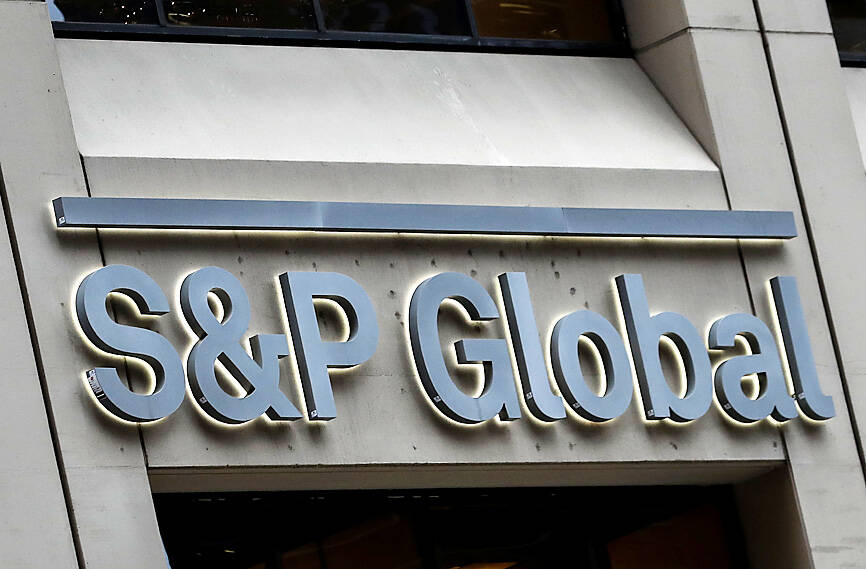The S&P Global Taiwan Manufacturing Purchasing Managers’ Index (PMI) was 51.5 last month, up from January’s 51.1, remaining in expansion territory for the 11th consecutive month, as demand for electronics picked up in the US and Europe, the international market intelligence service provider said yesterday.
The latest data suggested an improvement in Taiwanese manufacturers’ operations on the back of faster sales, production and inventory growth, S&P Global said, citing a monthly survey of local companies.
“Taiwan’s manufacturing sector was revitalized in February, posting faster increases in crucial barometers such as production, output, purchasing and inventories,” S&P Global Market Intelligence principal economist Joe Hayes wrote in a statement.

Photo: Reuters
Taken in tandem with a pickup in business confidence, the latest PMI survey results portray a positive near-term outlook, Hayes said.
PMI data aim to capture the pulse of the manufacturing industry, with values of 50 and higher indicating expansion, while values below the threshold suggesting contraction.
Sales growth was solid overall and slightly more robust than in January, thanks to rising demand from domestic and international customers, S&P Global said.
The uptick in new orders was particularly noticeable with customers in Europe and the US, it said.
Consequently, productivity displayed better momentum and output was higher, S&P Global said, adding that firms purchased additional inputs and stockpiled resources in response to greater business needs.
That explained why buying activity rose markedly, leading to a fourth consecutive month of expansion in preproduction stocks, it said.
Some companies showed eagerness to obtain materials ahead of anticipated sales, it added.
However, manufacturers in Taiwan reported a fractional drop in their workforces, which firms attributed to difficulty in filling positions.
In turn, backlogs of work rose for 10 months running and capacity pressures built up, S&P Global said.
Challenges filling vacancies had persisted for six consecutive months and cut across the industry, Hayes said.
That firms are struggling to recruit might restrict the strength of any upturn, he said.
Paradoxically, production growth would have further roadway if orders were to taper off, given current backlogs, which have risen for the past 10 months, Hayes said.
Looking ahead, Taiwanese manufacturers are optimistic of higher production levels over the next 12 months and the degree of optimism is the greatest since June last year, S&P Global said.
Bullish sentiment reflected positive demand projections, as Taiwan is home to the world’s major suppliers of critical electronic components used in artificial intelligence products, smartphones and notebook computers, it said.

In Italy’s storied gold-making hubs, jewelers are reworking their designs to trim gold content as they race to blunt the effect of record prices and appeal to shoppers watching their budgets. Gold prices hit a record high on Thursday, surging near US$5,600 an ounce, more than double a year ago as geopolitical concerns and jitters over trade pushed investors toward the safe-haven asset. The rally is putting undue pressure on small artisans as they face mounting demands from customers, including international brands, to produce cheaper items, from signature pieces to wedding rings, according to interviews with four independent jewelers in Italy’s main

Japanese Prime Minister Sanae Takaichi has talked up the benefits of a weaker yen in a campaign speech, adopting a tone at odds with her finance ministry, which has refused to rule out any options to counter excessive foreign exchange volatility. Takaichi later softened her stance, saying she did not have a preference for the yen’s direction. “People say the weak yen is bad right now, but for export industries, it’s a major opportunity,” Takaichi said on Saturday at a rally for Liberal Democratic Party candidate Daishiro Yamagiwa in Kanagawa Prefecture ahead of a snap election on Sunday. “Whether it’s selling food or

CONCERNS: Tech companies investing in AI businesses that purchase their products have raised questions among investors that they are artificially propping up demand Nvidia Corp chief executive officer Jensen Huang (黃仁勳) on Saturday said that the company would be participating in OpenAI’s latest funding round, describing it as potentially “the largest investment we’ve ever made.” “We will invest a great deal of money,” Huang told reporters while visiting Taipei. “I believe in OpenAI. The work that they do is incredible. They’re one of the most consequential companies of our time.” Huang did not say exactly how much Nvidia might contribute, but described the investment as “huge.” “Let Sam announce how much he’s going to raise — it’s for him to decide,” Huang said, referring to OpenAI

The global server market is expected to grow 12.8 percent annually this year, with artificial intelligence (AI) servers projected to account for 16.5 percent, driven by continued investment in AI infrastructure by major cloud service providers (CSPs), market researcher TrendForce Corp (集邦科技) said yesterday. Global AI server shipments this year are expected to increase 28 percent year-on-year to more than 2.7 million units, driven by sustained demand from CSPs and government sovereign cloud projects, TrendForce analyst Frank Kung (龔明德) told the Taipei Times. Demand for GPU-based AI servers, including Nvidia Corp’s GB and Vera Rubin rack systems, is expected to remain high,